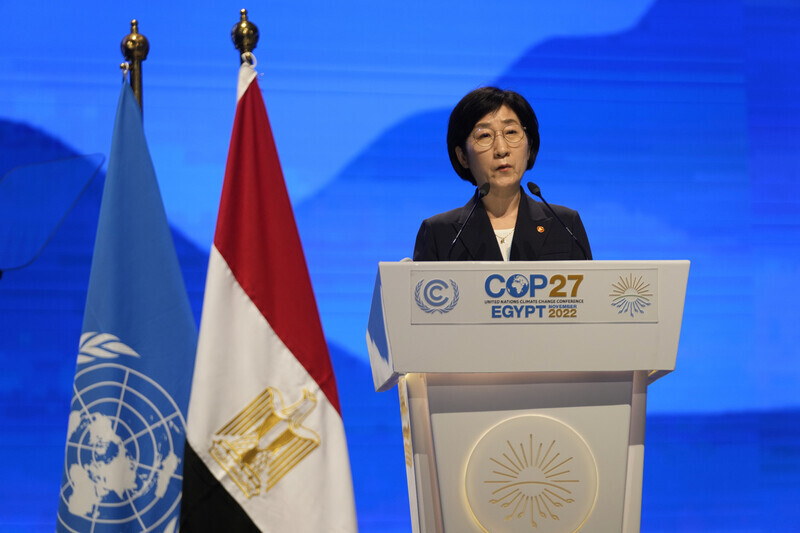hankyoreh
Links to other country sites 다른 나라 사이트 링크
Will Korea — a top 10 emitter — live up to responsibilities or become a climate villain?

Last month, I went to the Egyptian coastal city of Sharm el-Sheikh to cover an important event. Although it was November, it was as sunny and hot as the middle of the summer. It was in this city that 198 countries from all over the world were holding a series of intense talks and meetings to save the planet from climate change.
The Conference of the Parties to the United Nations Framework Convention on Climate Change, also known as COP, has been held every year on a different continent since 1995, except in 2020, when the meeting had to be canceled due to COVID-19.
The 27th iteration of the conference, which had originally been scheduled from Nov. 6-18 this year, ended two days later, on Nov. 20.
But I felt one major feeling of disappointment while at this conference, which was dealing with the global “hot issue” of climate change. This was because it was difficult to sense any kind of presence from the Korean government.
Last year, South Korea ranked as the world’s 10th-largest economy. It’s a strong, high-income country with a US$35,000 annual per capita income and is also part of the Group of 20.
However, behind South Korea’s high international status is also its responsibility for carbon dioxide emissions. Last year, South Korea ranked 10th in the world for CO2 emissions, with 616 million tons. This is similar to the combined total emissions (638 million tons) of the UK (346 million tons), the Netherlands (141 million tons), Belgium (95 million tons), and Greece (56 million tons).
In fact, South Korea's per capita carbon emissions last year were 11.9 tons, ranking fifth among the 38 OECD countries after Australia (15.1 tons), the US (14.9 tons), Canada (14.3 tons), and Luxembourg (13.1 tons). However, in reality, these facts are not well known.
"If you tell foreign climate activists about this, they are very surprised. This shows that the high level of South Korea’s [CO2] emissions is not yet a well-known fact,” says Jang Da-ul, a government relations and advocacy specialist at Greenpeace East Asia.
Nowadays, Korea has the economic capacity as well as the responsibility to play a bigger role internationally for its part in the climate crisis, given its own high emission levels. Nevertheless, this was not reflected at this latest COP27 conference.
The key issue discussed at the conference was the goal of establishing a “loss and damage” fund. However, when the Korean minister for the environment and the main representative of the Korean delegation at the conference, Han Wha-jin, was asked at a press conference in Egypt on Nov. 16 about the South Korean government’s role, she replied, “If new financial resources are decided on, then relevant ministries can determine what Korea will contribute.”
Through this very basic and obvious answer, it was impossible to find any real willingness to proactively respond to the climate crisis, despite Korea being a country that has the financial means and the responsibility to do so.
On the last day of the conference, the countries agreed to establish the loss and damage fund and included the details in an agreement.
Now, the South Korean government must respond to this result by showing how much it will contribute to this fund.
In these times, when the climate crisis is already closely affecting the lives of people around the world, countries who share a responsibility in contributing to this crisis but show a passive response in dealing with this issue are labeled as “climate villains” while those who take a more proactive approach are applauded.
So, which path will the Korean government take? Will it be the villain or will it be applauded for its efforts? And will the Korean government continue with its passive approach at COP28 in Dubai next year?
By Kim Kyu-nam, staff reporter
Please direct questions or comments to [english@hani.co.kr]

Editorial・opinion
![[Column] How opposing war became a far-right policy [Column] How opposing war became a far-right policy](https://flexible.img.hani.co.kr/flexible/normal/500/300/imgdb/original/2024/0702/5017199091002075.jpg) [Column] How opposing war became a far-right policy
[Column] How opposing war became a far-right policy![[Editorial] Korea needs to adjust diplomatic course in preparation for a Trump comeback [Editorial] Korea needs to adjust diplomatic course in preparation for a Trump comeback](https://flexible.img.hani.co.kr/flexible/normal/500/300/imgdb/original/2024/0702/9717199086060096.jpg) [Editorial] Korea needs to adjust diplomatic course in preparation for a Trump comeback
[Editorial] Korea needs to adjust diplomatic course in preparation for a Trump comeback- [Editorial] Silence won’t save Yoon
- [Column] The miscalculations that started the Korean War mustn’t be repeated
- [Correspondent’s column] China-Europe relations tested once more by EV war
- [Correspondent’s column] Who really created the new ‘axis of evil’?
- [Editorial] Exploiting foreign domestic workers won’t solve Korea’s birth rate problem
- [Column] Kim and Putin’s new world order
- [Editorial] Workplace hazards can be prevented — why weren’t they this time?
- [Editorial] Seoul failed to use diplomacy with Moscow — now it’s resorting to threats
Most viewed articles
- 110 days of torture: Korean mental patient’s restraints only removed after death
- 2Nine dead in Seoul after car plows into pedestrians
- 3[Editorial] Korea needs to adjust diplomatic course in preparation for a Trump comeback
- 4Korea to create dedicated population strategy ministry to combat low birth rate, aging society
- 5[Editorial] On the revival of Daehan News and theater boycott
- 6Samsung Electronics workers to go on first strike in company’s 55-year history
- 7Japan is building a military meant for more than self-defense — and has the US to thank for it
- 8[Column] How opposing war became a far-right policy
- 9Korean scientists publish research that could be used to development coronavirus treatment
- 10[Editorial] Silence won’t save Yoon